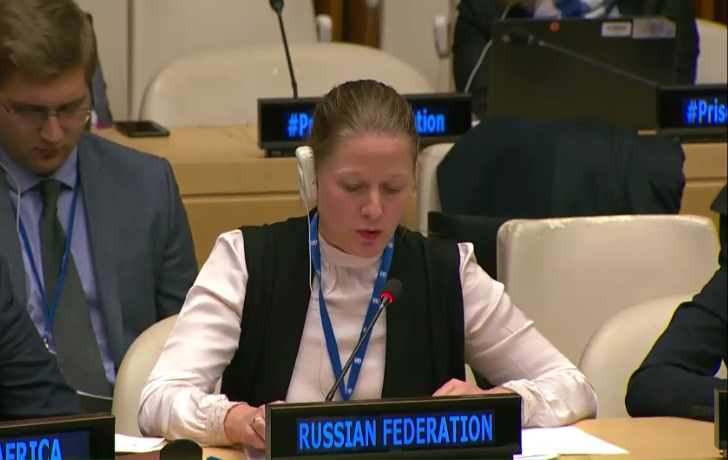Statement by representative of the Russian Federation Maria Zabolotskaya at Arria Formula Meeting "Challenges of Radicalization in Prisons"
Mr. President,
Today we are discussing a truly pressing problem. Reports on combatting radicalization in prisons in Belgium, Indonesia and Somalia prove that issues of spread of terrorist propaganda and evolving of terrorist cells in penitentiary facilities are equally relevant for both developing and developed states from regions that are most distant from each other.
Almost two years have passed since the adoption of Security Council resolution 2396 that stipulated a package of measures to counter foreign terrorist fighters. Ever since that time the UN Counter-Terrorism Committee has made much progress in elaborating mechanisms that implement this resolution, in the first place in the context of renewal of Madrid guiding principles on FTFs. However, the question still remains open as to what methods of rehabilitation and reintegration turn out to be the most effective and viable.
We are convinced the starting point of all efforts at this track is the understanding of principles of inevitability of punishment and its being commensurate with the crime committed. Justice should be administered to terrorists in national jurisdictions. Unfortunately, many countries, European in the first place, still prefer to withdraw from solving the issue of holding accountable those of their citizens who fought for terrorists in Syria or Iraq. What sounds most cynical is speculations about the importance of upholding human rights standards in prisons and participation of civil society in de-radicalization of terrorists, when the terrorists are abroad. Various mechanisms are used in order to prevent them from returning: withdrawal of citizenship, revoking of passports, decrees on provisional isolation and other so-called “administrative measures”.
It is even more flagrant that rights advocates avoid repatriation of terrorists’ children who are guilty of nothing, by citing potential threats to national security. It seems they believe authorities of Syria and Iraq have more capacity to administer justice to the under-aged foreigners, ensure their safety and patronize them.
Let me also remind that re-education of former militants should proceed both as they are in penitentiary facilities and after they leave them. However, it should not replace criminal prosecution. States are responsible for building reliable mechanisms of administering justice. This does not exclude an opportunity (in some cases – necessity) of involvement of social workers, psychologists, and clerics in working with individuals convicted of extremist and terrorist crimes.
We also have concerns about the fact that the pressing problem of radicalization in prisons is often used to promote the politicized concept of the so-called “violent extremism”. Instead of blurring the legal basis for countering terrorism, it would be much better to focus on implementing the existing international legal instruments (Security Council resolution 1624 in the first place) that help prevent terrorism and instigation to commit acts of terror.
Mr. President,
Russia has accumulated large expertise of countering spread of extremist and terrorist propaganda in penitentiary facilities. Activity at this track is carried out in strict compliance with the international law and national legislation, i.a. in the area of human rights. This activity rests on the Comprehensive Plan to Counter Terrorist Ideology for 2019-2023.
Practice shows that the real threat of terrorist indoctrination in prisons does not only come from those who have been incarcerated for crimes of terrorist and extremist nature. In Russian penitentiary facilities we encounter a situation, where those responsible for spreading radical pseudo-religious ideas are prisoners of foreign background who have been prosecuted for crimes non-related to terrorism or extremism, and whom, therefore our law enforcement bodies initially do not consider as potential terrorist recruiters.
In accordance with penal legislation of Russia, we work to avoid having high density of prisoners convicted of terrorism in particular penitentiary facilities. General rules of facilities apply to criminals of this category. When first entering prison, the incarcerated have their personalities closely studied. The personnel discover and track individuals who profess and promote the ideology of terror. Then re-educational and psychological services develop plans of individual events that account for personal features of criminals and the gravity of crimes they committed. Thanks to professional work of relevant services we manage to reveal and prevent attempts to recruit for terrorist or extremist organizations.
In order to implement the right of prisoners to freedom of conscience and worship, Russian Federal Penitentiary Service cooperates with representatives of traditional religious confessions of the country. All territorial bodies of the penitentiary system have Senior Officers whose responsibility is to reach out to prisoners and ensure prevention. They hold counselling sessions with prisoners representing various confessions, with participation of members of religious communities. The main objective is to make the adepts of ideology of violence doubt truthfulness of ideas they promote, including those based on ignorance or wrongful interpretation of religious dogmas.
Mr. President,
Russian specialized agencies have effective interaction with foreign partners on separate issues of countering terrorist and extremist organizations in penitentiary facilities. We intend to continue this activity, whereby we share experience of educational, disciplinary and psychological work in penitentiary facilities both bilaterally and via international organizations, including UN anti-terrorist bodies.
Thank you.
